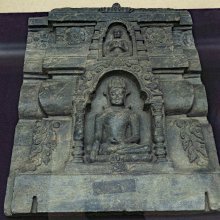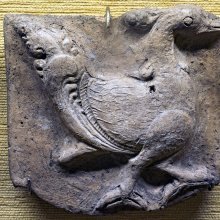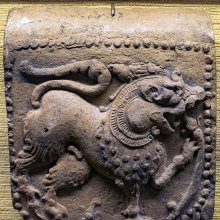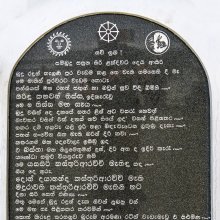Mati, Matī, Māṭi, Māti, Maṭi: 35 definitions
Introduction:
Mati means something in Buddhism, Pali, Hinduism, Sanskrit, Jainism, Prakrit, the history of ancient India, Marathi, Hindi, biology, Tamil. If you want to know the exact meaning, history, etymology or English translation of this term then check out the descriptions on this page. Add your comment or reference to a book if you want to contribute to this summary article.
Images (photo gallery)
(+11 more images available)
In Hinduism
Shaktism (Shakta philosophy)
Source: Wisdom Library: ŚāktismMati (मति, “devotion, prayer, resolution”):—Name of one of the sixty-four mātṛs to be worshipped during Āvaraṇapūjā (“Worship of the Circuit of Goddesses”, or “Durgā’s Retinue”), according to the Durgāpūjātattva. They should be worshipped with either the five upācāras or perfume and flowers.
Her mantra is as follows:
ॐ मत्यै नमः
oṃ matyai namaḥ.

Shakta (शाक्त, śākta) or Shaktism (śāktism) represents a tradition of Hinduism where the Goddess (Devi) is revered and worshipped. Shakta literature includes a range of scriptures, including various Agamas and Tantras, although its roots may be traced back to the Vedas.
Natyashastra (theatrics and dramaturgy)
Source: Wisdom Library: Nāṭya-śāstraMati (मति, “assurance”).—One of the thirty-three ‘transitory states’ (vyabhicāribhāva), according to the Nāṭyaśāstra chapter 7. These ‘transitory states’ accompany the ‘permanent state’ in co-operation.
Source: archive.org: Natya ShastraMati (मति, “assurance”) is caused by determinants (vibhāva) such as thinking about the meaning of many Śāstras and considering the pros and cons of things. It is to be represented on the stage by consequents (anubhāva) such as instructing pupils, ascertainment of [any] meaning, removal of doubt and the like.
Source: Shodhganga: Elements of Art and Architecture in the Trtiyakhanda of the Visnudharmottarapurana (natya)Mati (मति, “intellect”) refers to one of the various “transitory feelings of mind” (sañcāribhāva) in Indian Dramas, according to the Sāhityadarpaṇa.—The state of utsāha is the sthāyībhāva of vīrarasa. It increases energy and excitement to mind and projects the heroic sentiment through the sañcāribhāvas i.e., transitory feelings of mind like, e.g., mati (intellect).

Natyashastra (नाट्यशास्त्र, nāṭyaśāstra) refers to both the ancient Indian tradition (shastra) of performing arts, (natya—theatrics, drama, dance, music), as well as the name of a Sanskrit work dealing with these subjects. It also teaches the rules for composing Dramatic plays (nataka), construction and performance of Theater, and Poetic works (kavya).
Purana and Itihasa (epic history)
Source: archive.org: Puranic EncyclopediaMati (मति).—A daughter of Dakṣaprajāpati. She became the wife of Dharmarāja. (Śloka 15, Chapter 66, Ādi Parva).
Source: Cologne Digital Sanskrit Dictionaries: The Purana Index1a) Mati (मति).—A Yāma deva;1 addressed as, by Brahmā.2
1b) An Ābhūtaraya god.*
- * Brahmāṇḍa-purāṇa II. 36. 55; Vāyu-purāṇa 62. 48.
1c) A Bhavya god.*
- * Brahmāṇḍa-purāṇa II. 36. 72.
1d) Bhagavān so-called because the Kṣetrajña has a knowledge of kṣetra.*
- * Vāyu-purāṇa 59. 77.
Mati (मति) is a name mentioned in the Mahābhārata (cf. I.60.14) and represents one of the many proper names used for people and places. Note: The Mahābhārata (mentioning Mati) is a Sanskrit epic poem consisting of 100,000 ślokas (metrical verses) and is over 2000 years old.

The Purana (पुराण, purāṇas) refers to Sanskrit literature preserving ancient India’s vast cultural history, including historical legends, religious ceremonies, various arts and sciences. The eighteen mahapuranas total over 400,000 shlokas (metrical couplets) and date to at least several centuries BCE.
Yoga (school of philosophy)
Source: ORA: Amanaska (king of all yogas): A Critical Edition and Annotated Translation by Jason BirchMati (मति) refers to “thoughts”, according to the Yogatārāvalī: a short Yoga text of twenty-nine verses presenting Haṭhayoga as the means to Rājayoga (i.e., Samādhi).—Accordingly, while describing the no-mind state: “Let this mind wander into thoughtless Samādhi or into a pair of voluptuous breasts of [women] whose eyes are [as alluring as those of] the spotted black deer. Let it roam among the thoughts of idiots or the thoughts of the wise. The merits and faults produced by thought (mati) do not touch me, the king [of Rājayoga]”.

Yoga is originally considered a branch of Hindu philosophy (astika), but both ancient and modern Yoga combine the physical, mental and spiritual. Yoga teaches various physical techniques also known as āsanas (postures), used for various purposes (eg., meditation, contemplation, relaxation).
In Buddhism
Tibetan Buddhism (Vajrayana or tantric Buddhism)
Source: Wisdom Library: Tibetan BuddhismMati (मति) is the name of a Tathāgata (Buddha) mentioned as attending the teachings in the 6th century Mañjuśrīmūlakalpa: one of the largest Kriyā Tantras devoted to Mañjuśrī (the Bodhisattva of wisdom) representing an encyclopedia of knowledge primarily concerned with ritualistic elements in Buddhism. The teachings in this text originate from Mañjuśrī and were taught to and by Buddha Śākyamuni in the presence of a large audience (including Mati).
Source: OSU Press: Cakrasamvara SamadhiMati (मति) refers to the “(pure) mind” (of a lotus), according to the Cakrasaṃvara Samādhi [i.e., Cakrasamvara Meditation] ritual often performed in combination with the Cakrasaṃvara Samādhi, which refers to the primary pūjā and sādhanā practice of Newah Mahāyāna-Vajrayāna Buddhists in Nepal.—Accordingly, “Held by the left arm, the pure mind of a lotus (kamala-mati-sita), now a banner full of blood, A kālpā after the first, surrounded by a head, a half a head of loose hair”.

Tibetan Buddhism includes schools such as Nyingma, Kadampa, Kagyu and Gelug. Their primary canon of literature is divided in two broad categories: The Kangyur, which consists of Buddha’s words, and the Tengyur, which includes commentaries from various sources. Esotericism and tantra techniques (vajrayāna) are collected indepently.
Mahayana (major branch of Buddhism)
Source: academia.edu: A Study and Translation of the GaganagañjaparipṛcchāMati (मति) refers to “intelligence”, according to the Gaganagañjaparipṛcchā: the eighth chapter of the Mahāsaṃnipāta (a collection of Mahāyāna Buddhist Sūtras).—Accordingly, “What then, the son of good family, is memory (dhāraṇī)? (1) It is never forgetting the dharmas altogether; (2) not forgetting the dharmas as he heard; (3) recollecting memory; (4) understanding the meaning; (5) desiring intelligence (mati); (6) non-extinction of a syllable; (7) knowledge of understanding explanations and vocal sounds; (8) uninterrupted eloquence and unhindered teaching; [...]”.

Mahayana (महायान, mahāyāna) is a major branch of Buddhism focusing on the path of a Bodhisattva (spiritual aspirants/ enlightened beings). Extant literature is vast and primarely composed in the Sanskrit language. There are many sūtras of which some of the earliest are the various Prajñāpāramitā sūtras.
General definition (in Buddhism)
Source: Wisdom Library: Dharma-samgrahaMati (मति, “design”) refers to one of the fourty “conditions” (saṃskāra) that are “associated with mind” (citta-samprayukta) as defined in the Dharma-saṃgraha (section 30). The Dharma-samgraha (Dharmasangraha) is an extensive glossary of Buddhist technical terms in Sanskrit (e.g., mati). The work is attributed to Nagarjuna who lived around the 2nd century A.D.
In Jainism
General definition (in Jainism)
Source: archive.org: TrisastisalakapurusacaritraMati (मति) or Matijñāna refers to “sense-knowledge” and represents one of the five types of “right-knowledge” (samyagjñāna), as mentioned in chapter 1.3 [ādīśvara-caritra] of Hemacandra’s 11th century Triṣaṣṭiśalākāpuruṣacaritra: an ancient Sanskrit epic poem narrating the history and legends of sixty-three illustrious persons in Jainism. Accordingly, as mentioned in Ṛṣabha’s sermon:—“[...] mokṣa is attained by those who practice unceasingly the brilliant triad of knowledge, faith, and conduct. Among these, exact knowledge which comes from a summary or detailed study of the principles, jīva, etc., is called ‘right-knowledge’ (samyagjñāna). [...] Mati-jñāna is said to be divided into avagraha, etc., and these again into bahu, etc., and originates by means of the senses, and by means of the mind”.
There are 4 sub-divisions of mati, ‘sense-knowledge’:
- avagraha is perception of something by the senses;
- ihā (or ūhā) is the desire to know more about it;
- avāya, finding out the fact in the case;
- dharana, remembered knowledge leading to recognition.
Note: The ‘bahu, etc.’ refers to 12 sub-divisions of each of these 4 classes: much, manifold, quick, not indicated, untaught, firm, and the opposites of these.
Source: Encyclopedia of Jainism: Tattvartha SutraMati (मति, “mind-based”) refers to one of the five types of knowledge (jñāna) , according to Tattvārthasūtra 1.9—What is meant by mind-based knowledge (mati)? Knowledge acquired through the sensory organs and the mind and caused by the subsidence cum destruction of mind-based-knowledge-obscuring (matijnānāvarṇa) karma is called mind-based knowledge. It is also called sensory knowledge
What is the meaning of mati (sensory cognition)? It is the synonym of intellect implying knowledge acquired through sense organs and mind. What is the function of mati? The function of mati is the cognition with the aid of mind and sense organs through the stages of apprehension /sensation (avagraha), speculation /discrimination (īhā), perceptual judgment (avāya) and retention (dhāraṇā).
There are four divisions /stages of mind based knowledge (mati) namely out-linear-grasp /apprehension /sensation (avagraha), speculation /discrimination (īhā), perceptual judgment (avāya) and retention (dhāraṇā).
Source: JAINpedia: JainismMati (मति) or Abhinibodhika in Sanskrit (Abhiṇibohiya in Prakrit) refers to “perception or insight” and represents one of the five types of knowledge, as explained in the Nandīsūtra.—The heart of the Nandī-sūtra deals with the concept of cognition or knowledge in its various divisions and subdivisions. This is also an appropriate topic for a text that transcends all categories in the Śvetāmbara canon, for it can be regarded as a prerequisite to the scriptures. First comes the list of the five types of knowledge [viz., mati, “perception or insight”], known from other sources as well, such as the Tattvārtha-sūtra I. 9-33
Source: The University of Sydney: A study of the Twelve ReflectionsMati (मति) refers to “judgment”, according to the 11th century Jñānārṇava, a treatise on Jain Yoga in roughly 2200 Sanskrit verses composed by Śubhacandra.—Accordingly, “A bad birth is hard to be accomplished even in a dream for him whose judgment (mati), which is extremely skilful at examination like a door-keeper, shines in the mind. Having got rid of the multitude of imaginings, when the steady mind holds onto [its] nature, then it is indeed the best [form of] stopping the influx of karma for a mendicant”.

Jainism is an Indian religion of Dharma whose doctrine revolves around harmlessness (ahimsa) towards every living being. The two major branches (Digambara and Svetambara) of Jainism stimulate self-control (or, shramana, ‘self-reliance’) and spiritual development through a path of peace for the soul to progess to the ultimate goal.
India history and geography
Source: Institut Français de Pondichéry: The Shaivite legends of KanchipuramMati (மதி) (in Tamil) refers to Candra (Soma), and represents one of the proper nouns mentioned in the Kanchipuranam, which narrates the Shaivite Legends of Kanchipuram—an ancient and sacred district in Tamil Nadu (India). The Kanchipuranam (mentioning Mati) reminds us that Kanchipuram represents an important seat of Hinduism where Vaishnavism and Shaivism have co-existed since ancient times.

The history of India traces the identification of countries, villages, towns and other regions of India, as well as mythology, zoology, royal dynasties, rulers, tribes, local festivities and traditions and regional languages. Ancient India enjoyed religious freedom and encourages the path of Dharma, a concept common to Buddhism, Hinduism, and Jainism.
Biology (plants and animals)
Source: Google Books: CRC World Dictionary (Regional names)1) Mati in India is the name of a plant defined with Lablab purpureus in various botanical sources. This page contains potential references in Ayurveda, modern medicine, and other folk traditions or local practices It has the synonym Dolichos albus Lour. (among others).
2) Mati in Senegal is also identified with Pennisetum glaucum It has the synonym Alopecurus typhoides Burm.f. (etc.).
3) Mati in South America is also identified with Lagenaria siceraria It has the synonym Cucurbita leucantha Duchesne (etc.).
Example references for further research on medicinal uses or toxicity (see latin names for full list):
· Synopseos Plantarum (1805)
· Bulletin of the Torrey Botanical Club (1895)
· Bot. Žurn. (1996)
· Revised Handbook to the Flora of Ceylon (1931)
· Bulletin of Miscellaneous Information Kew (1933)
· Systema Vegetabilium (1817)
If you are looking for specific details regarding Mati, for example health benefits, pregnancy safety, chemical composition, side effects, extract dosage, diet and recipes, have a look at these references.

This sections includes definitions from the five kingdoms of living things: Animals, Plants, Fungi, Protists and Monera. It will include both the official binomial nomenclature (scientific names usually in Latin) as well as regional spellings and variants.
Languages of India and abroad
Pali-English dictionary
Source: BuddhaSasana: Concise Pali-English Dictionarymati : (f.) wisdom; idea.
Source: Sutta: The Pali Text Society's Pali-English DictionaryMati, (f.) (Vedic mati, fr. man: cp. Av. maitiš, Lat. mens, mentem (cp. E. mental); Goth. ga-munds, gaminpi, Ohg. gi-munt, E. mind) mind, opinion, thought; thinking of, hankering after, love or wish for Vin. III, 138 (purisa° thought of a man); Mhvs 3, 42 (padīpa lamp of knowledge); 15, 214 (amala° pure-minded); PvA. 151 (kāma+).—su° (adj.) wise, clever Mhvs 15, 214; opp. du° (adj.) foolish J. III, 83 (=duppañña C.); Pv. I, 82 (=nippañña PvA. 40); Sdhp. 292. (Page 517)

Pali is the language of the Tipiṭaka, which is the sacred canon of Theravāda Buddhism and contains much of the Buddha’s speech. Closeley related to Sanskrit, both languages are used interchangeably between religions.
Marathi-English dictionary
Source: DDSA: The Molesworth Marathi and English Dictionarymati (मति).—f (S) Understanding, intellect, mind.
--- OR ---
mātī (माती).—f (mṛtikā S) Earth. 2 Used freely to express utter destruction, utter worthlessness, insignificancy &c. Ex. pōrānēṃ saṃsārācī mātī karūna ṭākalī. 3 A term for the body (esp. as dead.) mātīāḍa karaṇēṃ-ghālaṇēṃ-ṭhēvaṇēṃ-ṭākaṇēṃ To put under the earth, lit. fig., to bury, shroud, cover up. mātīcyā mōlānēṃ vikaṇēṃ or dēṇēṃ To sell dirt-cheap mātī ṭākaṇēṃ -ghālaṇēṃ-lōṭaṇēṃ To throw earth over; to cast a mantle over (a dispute, offence &c.) mātī dēṇēṃ To inter (a corpse).
--- OR ---
matī (मती).—m f n) A Sanskrit affix to nouns ending otherwise than in a or ā, or in a consonant of which the inherent short vowel is dropped; forming them into attributives. Ex. buddhimān, śaktimān. This affix therefore supplies the deficient power of the affix vān q. v. Note. This affix, although its forms in gender are given above, is, in Maraṭhi, seldom declined.
Source: DDSA: The Aryabhusan school dictionary, Marathi-Englishmati (मति).—f Intellect, mind, understanding.
--- OR ---
mātī (माती).—f The earth. Utter destruction. mātīcyā mōlānēṃ vikaṇēṃ-dēṇēṃ Sell dirt-cheap. mātī dēṇēṃ Inter (a corpse).
Marathi is an Indo-European language having over 70 million native speakers people in (predominantly) Maharashtra India. Marathi, like many other Indo-Aryan languages, evolved from early forms of Prakrit, which itself is a subset of Sanskrit, one of the most ancient languages of the world.
Sanskrit dictionary
Source: DDSA: The practical Sanskrit-English dictionaryMati (मति).—f. [man bhāve ktin]
1) Intellect, understanding, sense, knowledge, judgment; मतिरेव बलाद्गरीयसी (matireva balādgarīyasī) H.2.86; अल्पविषया मतिः (alpaviṣayā matiḥ) R.1.2.
2) Mind, heart; मम तु मतिर्न मनागपैतु धर्मात् (mama tu matirna manāgapaitu dharmāt) Bv.4.26; so दुर्मति, सुमति (durmati, sumati).
3) Thought idea, belief, opinion, notion, supposition, impression, view; ध्रुवा नीतिर्मतिर्मम (dhruvā nītirmatirmama) Bhagavadgītā (Bombay) 18.78; विधिरहो बलवानिति मे मतिः (vidhiraho balavāniti me matiḥ) Bhartṛhari 2.98; Pañcatantra (Bombay) 2.19.
4) Intention, design, purpose; see मत्या (matyā).
5) Resolution, determination.
6) Esteem, regard, respect; बहुमतिमधिकां ययावशोकः (bahumatimadhikāṃ yayāvaśokaḥ) Kirātārjunīya 1.9.
7) Wish, desire, inclination; तस्य तासु मतिं ज्ञात्वा धर्मात्मा वाक्य- मब्रवीत् (tasya tāsu matiṃ jñātvā dharmātmā vākya- mabravīt) Rām.7.25.17; प्रायोपवेशनमतिर्नृपतिर्बभूव (prāyopaveśanamatirnṛpatirbabhūva) R.8.94.
8) Counsel, advice.
9) Remembrance, recollection.
10) Ved. Devotion, prayer.
11) An adviser.
12) = प्राणः (prāṇaḥ) q. v.; केन विज्ञानयोगेन मतिश्चित्तं समास्थिता (kena vijñānayogena matiścittaṃ samāsthitā) Mahābhārata (Bombay) 14.21. 11 (com.).
13) Activity or disposition of the mind; न मतेर्मन्तारं मन्वीथाः (na matermantāraṃ manvīthāḥ) Bṛ. Up.3.4.2.
14) Blessing. (matiṃ kṛ, -dhā, -ādhā 'to set the heart on', 'resolve upon', 'think of'. matyā is used adverbially in the sense of
1) knowingly, intentionally, wilfully; matyā bhuktvācaret kṛcchram Manusmṛti 4.222;5.19.
2) under the impression that; vyāghramatyā palāyante).
Derivable forms: matiḥ (मतिः).
--- OR ---
Māṭi (माटि).—An armour, mail.
Derivable forms: māṭiḥ (माटिः).
See also (synonyms): māṭhī.
--- OR ---
Māti (माति).—f.
1) Measure.
2) A thought, idea, conception.
3) Accurate knowledge or determination.
Derivable forms: mātiḥ (मातिः).
Source: Cologne Digital Sanskrit Dictionaries: Edgerton Buddhist Hybrid Sanskrit DictionaryMati (मति).—(1) name of a prince, son of the Buddha Candra-sūryapradīpa: Saddharmapuṇḍarīka 19.2; (2) name of a brahman youth, pre- vious incarnation of Dharmaruci; corresponds to Megha- datta of Mahāvastu, Megha of Pali, as associate of the previous incarnation of Śākyamuni (here called Sumati) under Dīpaṃkara: Divyāvadāna 247.2 ff.; (3) name of a prince, previous incarnation of Śākyamuni (is this the same as Sumati of Divyāvadāna?): Samādhirājasūtra p. 52 lines 21 (here text satī, read mati) and 30; (4) name of a teacher (a Buddha?) in the kṛta yuga: Laṅkāvatāra-sūtra 365.3; also called Mahāmati (5); in 365.7 apparently a different Mati (a Buddha, nāyakaḥ) is named, a later one, tho still in the kṛta yuga (Suzuki's translation(s) is wrong on this).
Source: Cologne Digital Sanskrit Dictionaries: Shabda-Sagara Sanskrit-English DictionaryMati (मति).—f.
(-tiḥ) 1. Understanding, intellect. 2. Wish, desire, inclination. 3. Memory, recollection. 4. Respect, reverence. 5. A potherb. E. man to respect, &c. aff. ktin .
--- OR ---
Māti (माति).—f.
(-tiḥ) 1. Measure. 2. Conception, idea.
Source: Cologne Digital Sanskrit Dictionaries: Benfey Sanskrit-English DictionaryMati (मति).—i. e. man + ti, f. 1. Mind, [Pañcatantra] iii. [distich] 76. 2. Understanding, [Pañcatantra] 251, 6; intelligence, [Hitopadeśa] pr. [distich] 42. 3. Thought, [Pañcatantra] iii. [distich] 258; resolution, [Pañcatantra] 216, 14. 4. Hymn,
Mati (मति).—[feminine] devotion, prayer, worship, hymn or song of praise; thought, purpose, mind, intention to ([locative], [dative], or infin.); thought, meditation, opinion, belief; understanding, intelligence. matyā on purpose or at discretion.
--- OR ---
Mati (मति).—[feminine] devotion, prayer, worship, hymn or song of praise; thought, purpose, mind, intention to ([locative], [dative], or infin.); thought, meditation, opinion, belief; understanding, intelligence. matyā on purpose or at discretion.
Source: Cologne Digital Sanskrit Dictionaries: Monier-Williams Sanskrit-English Dictionary1) Mati (मति):—a etc. See p. 783, col. 2.
2) [from man] b f. (in, [Śatapatha-brāhmaṇa] also mati) devotion, prayer, worship, hymn, sacred utterance, [Ṛg-veda; Vājasaneyi-saṃhitā]
3) [v.s. ...] thought, design, intention, resolution, determination, inclination, wish, desire (with [locative case] [dative case] or [infinitive mood]), [Ṛg-veda] etc. etc. (matyā ind. wittingly, knowingly, purposely; matiṃ √kṛ or dhā or dhṛ or ā-√dhā or samā-√dhā or ā-√sthā or sam-ā-√sthā, with [locative case] [dative case] [accusative] with prati, or artham ifc., to set the heart on, make up one’s mind, resolve, determine; matim with [Causal] of ni-√vṛt and [ablative] of a verbal noun, to give up the idea of; āhita-mati ifc. -having resolved upon; vinivṛtta-mati with [ablative] = having desisted from)
4) [v.s. ...] opinion, notion, idea, belief, conviction, view, creed, [???; Manu-smṛti; Mahābhārata] etc. (matyā ind. at will; ifc., ‘under the idea of’ e.g. vyāghra-m, ‘under the idea of its being a tiger’)
5) [v.s. ...] the mind, perception, understanding, intelligence, sense, judgement, [Śatapatha-brāhmaṇa] etc. etc. (in, [Ṛg-veda] also ‘that which is sensible’, intelligent, mindful, applied to Aditi, Indra and Agni)
6) [v.s. ...] esteem, respect, regard, [Kirātārjunīya]
7) [v.s. ...] memory, remembrance, [cf. Lexicographers, esp. such as amarasiṃha, halāyudha, hemacandra, etc.]
8) [v.s. ...] Opinion personified (and identified with Subalātmajā as one of the mothers of the five sons of Pāṇḍu, or regarded as a daughter of Dakṣa and wife of Soma, or as the wife of Viveka), [Mahābhārata; Harivaṃśa; Prabodha-candrodaya]
9) [v.s. ...] a kind of vegetable or pot-herb, [cf. Lexicographers, esp. such as amarasiṃha, halāyudha, hemacandra, etc.]
10) [v.s. ...] m. Name of a king, [Buddhist literature]
11) [v.s. ...] cf. [Latin] mens; [Anglo-Saxon] ge-mynd; [English] mind.
12) Māti (माति):—[from mā] a f. measure, accurate knowledge, [cf. Lexicographers, esp. such as amarasiṃha, halāyudha, hemacandra, etc.]
13) [v.s. ...] a [particular] part of the body, [cf. Lexicographers, esp. such as amarasiṃha, halāyudha, hemacandra, etc.]
14) Māṭi (माटि):—f. armour, mail, [cf. Lexicographers, esp. such as amarasiṃha, halāyudha, hemacandra, etc.]
15) Mātī (माती):—[from māta] f. in vān mātī, [Taittirīya-saṃhitā] (mātyā, [Vājasaneyi-saṃhitā; Maitrāyaṇī-saṃhitā]; cf. [Pāṇini 4-1, 85], [vArttika] 1, [Patañjali])
16) Māti (माति):—b mātu See p. 804, col. 2.
Source: Cologne Digital Sanskrit Dictionaries: Yates Sanskrit-English DictionaryMati (मति):—(tiḥ) 2. f. Understanding; wish; memory; respect.
Source: DDSA: Paia-sadda-mahannavo; a comprehensive Prakrit Hindi dictionary (S)Mati (मति) in the Sanskrit language is related to the Prakrit words: Mai, Mitti.
[Sanskrit to German]
Sanskrit, also spelled संस्कृतम् (saṃskṛtam), is an ancient language of India commonly seen as the grandmother of the Indo-European language family (even English!). Closely allied with Prakrit and Pali, Sanskrit is more exhaustive in both grammar and terms and has the most extensive collection of literature in the world, greatly surpassing its sister-languages Greek and Latin.
Hindi dictionary
Source: DDSA: A practical Hindi-English dictionary1) Mati (मति):—(nf) intellect; understanding; thought; opinion, view; ~[bhraṃśa] psychosis, derangement; ~[bhrama/bhrāṃtī] hallucination; confusion; ~[bhraṣṭa] deranged, mentally derailed; ~[maṃda] idiot, low-witted, nincompoop; ~[hīna] stupid, foolish; —[phiranā] one’s view/stand to undergo a change; one’s thought/view to be degenerated; —[mārī jānā] to lose wits, to be stupefied, to be stunned; —[hara lenā] to render thoughtless/incapable of thinking.
2) Māṭī (माटी):—(nf) /see /[miṭṭī; /-kī mūrata] a nincompoop, stupid fellow; ineffective person.
...
Kannada-English dictionary
Source: Alar: Kannada-English corpusMati (ಮತಿ):—
1) [noun] the mind as the faculty of perception, understanding, etc.
2) [noun] the act of using the will; exercise of the will as in deciding what to do; volition.
3) [noun] notion, thought, opinion or intention, as the result of deliberation of the mind.
4) [noun] (rhet.) one of the minor sentiments in dramatics.
5) [noun] name of one of the twelve petals of the mystical lotus flower in the centre of the body.
6) [noun] (jain.) the act of thinking seriously and deeply about or pondering over; a meditating upon.
--- OR ---
Māti (ಮಾತಿ):—
1) [noun] the middle-sized, deciduous tree Boswellia serrata ( = B. thurifera) of Burseraceae family; Indian olibanum tree.
2) [noun] its fruit.
Kannada is a Dravidian language (as opposed to the Indo-European language family) mainly spoken in the southwestern region of India.
Tamil dictionary
Source: DDSA: University of Madras: Tamil LexiconMaṭi (மடி) [maṭital] 4 intransitive verb
1. [K. maḍi.] To be bent, folded, turned down, lapped in; மடங்குதல். வள்ளலார்சாத்திரம்ுகிர் மடிய [madanguthal. vallugir madiya] (கம்பராமாயணம் கும்ப. [kambaramayanam kumba.] 182).
2. To be turned, as an edge or a point; நுனி மழுங்குதல். வயிரவாளை . . . வாய்மடிய வீழ்த்த [nuni mazhunguthal. vayiravalai . . . vaymadiya vizhtha] (வாயுசங்கிதை யாவுஞ். [vayusangithai yavugn.] 3).
3. To droop, as the head of one asleep or as sheafs of grain in a field; தலைசாய்தல். [thalaisaythal.] (W.)
4. To fall on; வீழ்தல். மடி மடிந்து மாண்ட வுஞற்றி லவர்க்கு [vizhthal. madi madinthu manda vugnarri lavarkku] (திருக்குறள் [thirukkural], 604).
5. To wither, as leaves; வாடுதல். [vaduthal.] Local usage
6. To roll, as waves; சுருளுதல். மடிதிரை தந்திட்ட . . . முத் தம் [suruluthal. madithirai thanthitta . . . muth tham] (நாலடியார் [naladiyar], 224).
7. [Malayalam: maṭi.] To be indolent, inactive; முயற்சியறுதல். மடியா வினைஞர் [muyarsiyaruthal. madiya vinaignar] (பத்துப்பாட்டு: பெரும்பாணாற்றுப்படை [pathuppattu: perumbanarruppadai] 254).
8. To sleep; தூங்குதல். மன் பதை யெல்லா மடிந்த விருங்கங்குல் [thunguthal. man pathai yella madintha virungangul] (கலித்தொகை [kalithogai] 65).
9. To shrink, contract; சுருங்குதல். வீங்கு சுரை மடிய [surunguthal. vingu surai madiya] (அகநா. [agana.] 54).
10. To be dispirited; ஊக்கங்குறைதல். உவவு மடிந்துண் டாடியும் [ukkanguraithal. uvavu madinthun dadiyum] (பத்துப்பாட்டு: பட்டினப்பாலை [pathuppattu: pattinappalai] 93).
11. [K. maḍi.] To perish; to be destroyed; அழிதல். குடிமடிந்து குற்றம் பெருகும் [azhithal. kudimadinthu kurram perugum] (திருக்குறள் [thirukkural], 604).
12. To die; சாதல். வல்லது மடிதலே யென்னின் மாறுதிர் [sathal. vallathu madithale yennin maruthir] (கம்பராமாயணம் அதிகா. [kambaramayanam athiga.] 6).
13. To become mouldy, as rice; தானியங்கேடுறுதல். மடிந்துபோன அரிசி. [thaniyangeduruthal. madinthupona arisi.]
14. To rush in together, as a crowd; திரண்டு செல்லுதல். ஜனங்கள் உற்சவத் துக்கு மடிகிறார்கள். [thirandu selluthal. janangal ursavath thukku madigirarkal.]
15. To break; to be broken, as a blister; கொப்புளமுடைதல். [koppulamudaithal.] (J.) — transitive To forget; மறத்தல். சேமமடிந்த பொழுதில் [marathal. semamadintha pozhuthil] (பத்துப்பாட்டு: குறிஞ்சிப்பாட்டு [pathuppattu: kurinchippattu] 156).
--- OR ---
Maṭi (மடி) [maṭittal] 11 transitive verb Causative of மடி¹-. [madi¹-.] [Telugu: maḍutsu.]
1. To fold, as the arms; to fold up, as cloth, as paper; to double up, shut up, as a folding knife; மடக்குதல். [madakkuthal.]
2. To bend, turn down, turn in, curl; வளைத்தல். [valaithal.]
3. To baffle in speech, confound by artifice, as in an argument; பேச்சில் மடங்கவடித்தல். [pechil madangavadithal.] (W.)
4. cf. math. To kill, destroy; அழித்தல். மரனெலா மடிப்ப [azhithal. maranela madippa] (கம்பராமாயணம் தாடகை. [kambaramayanam thadagai.] 35).
5. To trample down; to throw into confusion; உழக்குதல். (பிங்கலகண்டு) [uzhakkuthal. (pingalagandu)]
--- OR ---
Maṭi (மடி) noun < மடி¹-. [madi¹-.]
1. [K. maḍi.] Bending down, as sheaf of paddy; மடங்குகை. (பிங்கலகண்டு) [madangugai. (pingalagandu)]
2. Crease in the abdomen; வயிற்று மடிப்பு. [vayirru madippu.]
3. Belly, stomach; வயிறு. இடாகினிப்பேய் வாங்கி மடியகத்திட்டாண் மகவை [vayiru. idaginippey vangi madiyagathittan magavai] (சிலப்பதிகாரம் அரும்பதவுரை [silappathigaram arumbathavurai] 9, 22).
4. Waist; அரை. பணப்பையை மடியிற் கட்டிக்கொண்டான். [arai. panappaiyai madiyir kattikkondan.]
5. Lap; மடித்ததொடையின் மேற்பாகம். குழந்தை அவன் மடியில் உட்கார்ந்துகொண்டிருந்தது. [madithathodaiyin merpagam. kuzhanthai avan madiyil udkarnthugondirunthathu.]
6. Fold, as in a paper; ஆடை காகித முதலியவற்றின் மடிப்பு. [adai kagitha muthaliyavarrin madippu.]
7. Cloth, garment; ஆடை. குறியவு நெடியவு மடிதரூஉ விரித்து [adai. kuriyavu nediyavu maditharuu virithu] (பத்துப்பாட்டு: மதுரைக்காஞ்சி [pathuppattu: mathuraikkanchi] 520).
8. Cloth made of the fibre of trees, coarse silk, cotton, etc., as ceremonially pure; தூய்மையாக உடுத்தும் மரவுரி, பட்டு, பருத்தி முதலியவற்றாலாகிய ஆடைவகை. உடுக்க மடி கொண்டுவா. [thuymaiyaga uduthum maravuri, pattu, paruthi muthaliyavarralagiya adaivagai. udukka madi konduva.] Colloq.
9. Ceremonial purity, as of one who has bathed; தீட்டில்லா நிலை. நான் மடியா யிருக்கிறேன், என்னைத் தொடாதே. [thittilla nilai. nan madiya yirukkiren, ennaith thodathe.]
10. Piece consisting of a certain number of cloths; பலதுண்டுகள் கொண்ட ஆடைவகை. [palathundugal konda adaivagai.]
11. Fold in a cloth wrapped round the waist, answering for a pocket; பைபோன்ற முந்திச் சொருக்கு. [paiponra munthis sorukku.]
12. A kind of net; வலைவகை. [valaivagai.] (W.)
13. Large bag attached to a fishing net; மீன் வலையோடு சேர்ந்த பெரும் பை. [min valaiyodu serntha perum pai.] Local usage
14. Udder, especially of a cow; பசு முதலியவற்றின் முலையிடம். மடி வெண் டிங்களா [pasu muthaliyavarrin mulaiyidam. madi ven dingala] (கம்பராமாயணம் ஊர்தே. [kambaramayanam urthe.] 56).
15. Submission; அடக்கம். (பிங்கலகண்டு) [adakkam. (pingalagandu)]
16. Loneliness; தனிமை. (பிங்கலகண்டு) [thanimai. (pingalagandu)]
17. [Malayalam: mati.] Sloth, idleness, indolence; சோம்பல். போகூழாற் றோன்று மடி [sombal. poguzhar ronru madi] (திருக்குறள் [thirukkural], 371).
18. Lazy person; சோம்பலுடைய வன். களிமடி மானி [sombaludaiya van. kalimadi manimegalai] (நன். [nan.] 39).
19. Disease, ailment; நோய். (பிங்கலகண்டு) [noy. (pingalagandu)]
20. Ruin, loss, detriment, damage; கேடு. (பிங்கலகண்டு) [kedu. (pingalagandu)]
21. Lie, falsehood; பொய். (பிங்கலகண்டு) [poy. (pingalagandu)]
22. Hatred, enmity; பகை. (சூடாமணிநிகண்டு) [pagai. (sudamaninigandu)]
23. Bad odour; துர்க்கந்தம். மடி நாறு மேனி [thurkkantham. madi naru meni] (தேவாரம் [thevaram] 30, 4).
24. Double catamaran; இரட்டைக் கட்டுமரம். [irattaig kattumaram.] (G. T n. D. I , 229.)
25. Boiled rice; சோறு. (அகராதி நிகண்டு) [soru. (agarathi nigandu)]
26. Fragrant screw-pine. See தாழை [thazhai],
1. (பிங்கலகண்டு [pingalagandu])
27. External root of the screw-pine; தாழைவிழுது. [thazhaivizhuthu.] (தைலவருக்கச்சுருக்கம் தைல. [thailavarukkachurukkam thaila.] 125.)
28. Turn, time; மடங்கு. கூற்றினும் மும்மடி கொன்றான் [madangu. kurrinum mummadi konran] (கம்பராமாயணம் இலங்கையெரி. [kambaramayanam ilangaiyeri.] 57).
--- OR ---
Mati (மதி) noun < mati.
1. Understanding, intellect; இயற்கை யறிவு. மதிநுட்ப நூலோடுடை யார்க்கு [iyarkai yarivu. mathinudpa nulodudai yarkku] (திருக்குறள் [thirukkural], 636).
2. Discrimination, judgment, discernment; பகுத்தறிவு. மதியிலி மடநெஞ்சே [pagutharivu. mathiyili madanenche] (திருவாசகம் [thiruvasagam] 5, 33).
3. Duty of listening to exposition of the Vēdas and acting in accordance with the precepts thereof; வேதங்களிற் கூறியவற்றைக் கேட்டலும் அதன்படி நடத்தலுமாகிய செய்கடன். ((சங்கத்தகராதி) தமிழ்சொல்லகராதி) [vethangalir kuriyavarraig kettalum athanpadi nadathalumagiya seykadan. ((sangathagarathi) thamizhsollagarathi)]
4. Esteem, value; மதிப்பு. நீண்மதிக் குலிசம் [mathippu. ninmathig kulisam] (இரகுவமிசம் யாகப். [iraguvamisam yagap.] 92).
5. A wife of Kāśyapa and daughter of Dakṣa; காசியபரின் மனைவியான தக்ஷன்மகள். மதி யென்பாள் . . . பயந்தனளால் [kasiyaparin manaiviyana thagshanmagal. mathi yenpal . . . payanthanalal] (கம்பராமாயணம் சடாயுகாண். [kambaramayanam sadayugan.] 26).
6. Asōka tree; பிண்டி. ((சங்கத்தகராதி) தமிழ்சொல்லகராதி) [pindi. ((sangathagarathi) thamizhsollagarathi)]
--- OR ---
Mati (மதி) [matittal] 11 transitive verb < மதி¹. [mathi¹.]
1. To estimate, value, compute; அளவிடுதல். மண் விழைந்து வாழ்நாண் மதியாமை [alaviduthal. man vizhainthu vazhnan mathiyamai] (திரிகடுகம் [thirigadugam] 29).
2. To esteem, regard, respect, reverence; பொருட்படுத் துதல். மண்ணாள்வான் மதித்துமிரேன் [porudpaduth thuthal. mannalvan mathithumiren] (திருவாசகம் [thiruvasagam] 5, 12).
3. To think; to consider; கருதுதல். ஆடலை மதித்தான் [karuthuthal. adalai mathithan] (கந்தபு. திருவிளையாடற் புராணம் [kanthapu. thiruvilaiyadar puranam] 1).
4. To meditate upon; தியானித்தல். நந்தியங் குரவனை மதிப்பாம் [thiyanithal. nanthiyang kuravanai mathippam] (விநாயகபு. கடவுள். [vinayagapu. kadavul.] 13).
5. To decide; to ascertain; to be assured of; துணிதல். தேர்மணிக் குர லென விவண் மதிக்குமன் [thunithal. thermanig kura lena vivan mathikkuman] (கலித்தொகை [kalithogai] 126, 7).
--- OR ---
Mati (மதி) noun probably from மதி²-. [mathi²-.]
1. Moon, full moon; சந்திரன். மதிப் பின்னீர பேதையார் நட்பு [santhiran. mathip pinnira pethaiyar nadpu] (திருக்குறள் [thirukkural] 782).
2. Month, மாதம். தசமதி தாயொடு தான்படும் [matham. thasamathi thayodu thanpadum] (திருவாசகம் [thiruvasagam] 4, 24).
3. Sign of the zodiac; இராசி. ஆறிரு மதியினும் [irasi. ariru mathiyinum] (சிலப்பதிகாரம் அரும்பதவுரை [silappathigaram arumbathavurai] 26, 25).
4. Kubera; குபேரன். தென்றிசை மதியின் வாளி [kuperan. thenrisai mathiyin vali] (மகாபாரதம் நிரைமீட். [magaparatham niraimid.] 100).
5. Breath passing through the left nostril; இடைகலை. மதியிலிரு நான் கிரேசித்து [idaigalai. mathiyiliru nan kiresithu] (காசிகண்டம் யோக. [kasigandam yoga.] 23).
6. See மதிநாள். (சூடாமணிநிகண்டு) [mathinal. (sudamaninigandu)]
7. The number 'one'; ஒன்று என்னும் எண்ணைக்குறிக்கும் குழூஉக்குறி. [onru ennum ennaikkurikkum kuzhuukkuri.] (E. T. ii, 96.)
8. Cancer of the zodiac, as the Moon's house; கற்கடகராசி. ((சங்கத்தகராதி) தமிழ்சொல்லகராதி) [karkadagarasi. ((sangathagarathi) thamizhsollagarathi)]
--- OR ---
Mati (மதி) noun probably from மது. [mathu.] Liquorice-plant. See அதிமதுரம். ((சங்கத்தகராதி) தமிழ்சொல்லகராதி) [athimathuram. ((sangathagarathi) thamizhsollagarathi)]
--- OR ---
Mati (மதி) particle
1. An euphonic suffix of the imperative mood; ஒரு முன்னிலை யசைச்சொல். [oru munnilai yasaichol.] (தொல். சொல். [thol. sol.] 276.)
2. Expletive of the third person; ஒரு படர்க்கை யசைச்சொல். பரிசி னல்கு மதி [oru padarkkai yasaichol. parisi nalku mathi] (பத்துப்பாட்டு [pathuppattu] 295).
--- OR ---
Mati (மதி) [matittal] 11 transitive verb < math. To churn; கடைதல். மந்தரங்கொடு மதித்தநாள் [kadaithal. mantharangodu mathithanal] (சேதுபுராணம் சங்கர. [sethupuranam sangara.] 20).
--- OR ---
Mati (மதி) [matittal] 11 intransitive verb < mada.
1. To be haughty; கொழுத்தல். மதித்தெதிர் தெவ்வர் [kozhuthal. mathithethir thevvar] (இரகுவமிசம் மீட்சி. [iraguvamisam midsi.] 37).
2. To be furious; மதங் கொள்ளுதல். மதித்த களிற்றினின் [mathang kolluthal. mathitha kalirrinin] (கம்பராமாயணம் பஞ்சசே. [kambaramayanam panchase.] 56).
3. To bloat; உப்புதல். உடம்பு மதித்து விட்டது. [upputhal. udambu mathithu vittathu.] Local usage
--- OR ---
Mati (மதி) noun probably from madin. Elephant; யானை. கோண் மதித்திடர் கிடந்தன [yanai. kon mathithidar kidanthana] (கம்பராமாயணம் நாகபாச. [kambaramayanam nagapasa.] 136).
--- OR ---
Mati (மதி) [matittal] 11 intransitive verb Corr. of மரி-. குழந்தை மதித்துப் பிறந்தது. [mari-. kuzhanthai mathithup piranthathu.] Local usage
--- OR ---
Māṭi (மாடி) noun cf. māḍi. Terrace; உபரிகை. [uparigai.]
--- OR ---
Māṭi (மாடி) noun < māḍhi. (W.)
1. Distress; இக்கட்டு. [ikkattu.]
2. Anger, passion; கோபம். [kopam.]
3. Hem or border of garment; புடைவையின் விளிம்பு. [pudaivaiyin vilimbu.]
--- OR ---
Māṭi (மாடி) noun Feminine of மாடன். [madan.] A village goddess; ஒரு கிராமதேவதை. [oru kiramathevathai.] Nāñ.
--- OR ---
Māti (மாதி) noun cf. mātha.
1. Circular motion; வட்டமாயோடல். (சூடாமணிநிகண்டு) மாதி வட்ட மோடினார் [vattamayodal. (sudamaninigandu) mathi vatta modinar] (கம்பராமாயணம் பிரமாத்திர. [kambaramayanam piramathira.] 135).
2. (Astronomy) Revolution of a planet; கிரகச்சுற்று. [kiragachurru.] (W.)
--- OR ---
Māti (மாதி) noun cf. மாந்தி¹. [manthi¹.] Mango; மாமரம். மாதி மணங்கமழும் பொழில் [mamaram. mathi manangamazhum pozhil] (திருவிசை. சேந்த. [thiruvisai. sentha.] 2, 2).
Tamil is an ancient language of India from the Dravidian family spoken by roughly 250 million people mainly in southern India and Sri Lanka.
See also (Relevant definitions)
Starts with (+270): Mati chaching, Mati katota, Mati keseru, Mati kotota, Mati laki mati bini, Mati sedangor, Mati-katota, Mati-khau-kan, Mati-mankayitu, Mati-mankaypotu, Mati-mekakal, Mati-muttartali, Mati-pharuwa, Mati-sul, Mati-terikalai, Mati-y-ampal, Matia, Matia-jam, Matiana, Matiarisafar.
Ends with (+708): A-campirannatacamati, Abbhunnamati, Abhidhamati, Abhikkamati, Abhimati, Abhinamati, Abhinikkhamati, Abhinishkramati, Abhipranamati, Abhiramati, Abhisammati, Abhratrimati, Acalamati, Acamati, Acammati, Acchimati, Achalamati, Adabdhavratapramati, Advaitamati, Agramati.
Full-text (+1165): Mathi, Madi, Matiprakarsha, Mativitu, Matimat, Abhimati, Abhishumat, Matiyari, Papamati, Sumati, Maticevi, Durmati, Mithyamati, Manimati, Matippanam, Mandamati, Mahamati, Vasumati, Matiyil, Matikal.
Relevant text
Search found 121 books and stories containing Mati, Maadi, Maathi, Madhi, Madi, Mathi, Matī, Mātī, Māṭi, Māti, Māṭī, Maṭi; (plurals include: Matis, Maadis, Maathis, Madhis, Madis, Mathis, Matīs, Mātīs, Māṭis, Mātis, Māṭīs, Maṭis). You can also click to the full overview containing English textual excerpts. Below are direct links for the most relevant articles:
Concept of Mind in the Major Upanishads (by Gisha K. Narayanan)
1. The Characteristics of mind < [Chapter 1 - Introduction]
9(b). Different Names of Prajñā < [Chapter 4 - The concept of Mind in the Major Upaniṣads]
9(a). The Concept of Mind in the Aitareyopaniṣad < [Chapter 4 - The concept of Mind in the Major Upaniṣads]
Rig Veda (translation and commentary) (by H. H. Wilson)
Bhakti-rasamrta-sindhu (by Śrīla Rūpa Gosvāmī)
Verse 2.4.140 < [Part 4 - Transient Ecstatic Disturbances (vyābhicāri-bhāva)]
Verse 3.1.33 < [Part 1 - Neutral Love of God (śānta-rasa)]
Verse 4.3.17 < [Part 3 - Chivalry (vīrya-rasa)]
Garga Samhita (English) (by Danavir Goswami)
Verse 4.19.86 < [Chapter 19 - A Thousand Names of Srī Yamunā]
Verse 5.19.1 < [Chapter 19 - The Festival on Śrī Kṛṣṇa Return]
Verse 4.9.13 < [Chapter 9 - The Glories of Srī Ekādaśī]
Tattvartha Sutra (with commentary) (by Vijay K. Jain)
Verse 1.13 - Synonyms of sensory-knowledge (matijñāna) < [Chapter 1 - Right Faith and Knowledge]
Verse 1.31 - Erroneous knowledge (viparyaya) < [Chapter 1 - Right Faith and Knowledge]
Verse 1.14 - Cause of sensory-knowledge < [Chapter 1 - Right Faith and Knowledge]
Sahitya-kaumudi by Baladeva Vidyabhushana (by Gaurapada Dāsa)
Text 4.40 < [Chapter 4 - First-rate Poetry]
Text 10.209 < [Chapter 10 - Ornaments of Meaning]
Text 10.212 < [Chapter 10 - Ornaments of Meaning]
Related products









